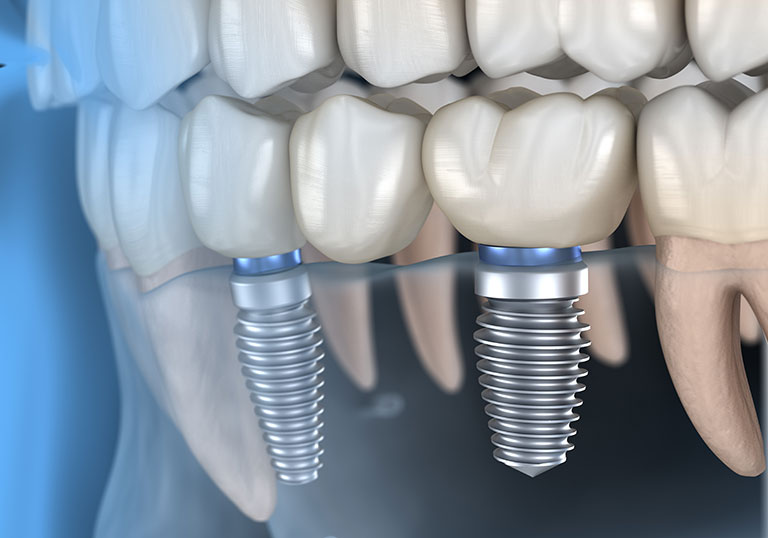

Do you have missing teeth? Are you uncomfortable about your missing teeth? If you are thinking whether replacing your missing teeth is possible? The answer is yes!
There are so many benefit of replacing your missing teeth. It improves your look and appearances. It can also help to keep your remaining teeth healthy. Also you will eat more comfortably and speak more clearly as well, when your missing teeth are replaced.
You can read to learn more on the treatment option that is suitable to replace tour missing teeth.

There may be a change in the way you bite if you have missing teeth because your remaining teeth may lean over the gaps the missing teeth created. These gaps can also trap some food which increases your risk of tooth decay and gum disease.
Your facial muscle may sag if you have a lot of missing teeth. Your speech may be affected if you have many of your teeth missing and you will not have the confidence to talk because you are conscious people will notice the gaps.
You can smile more confidently, eat comfortable and keep your mouth health if you choose to replace your missing teeth.
There are different procedures through which your missing teeth can be replaced. The procedures include dentures, bridges and implants.
The procedure that will be used for your missing teeth replacement depends on the number of teeth that is missing, the condition of the gum and the cost of treatment.
When missing teeth is to be replaced— a replacement tooth will be fabricated to match the colour of your natural teeth. The options for treating missing teeth may include the use of removable plastic or metal frameworks that have false teeth attached (full or partial dentures) — false teeth that are fixed on to existing natural teeth (bridges), false teeth can be fitted on top of a titanium implant that is fixed directly into your jawbone (dental implants).
You can read further to find out more about each treatment for replacing a missing teeth option below —you can call a customer care representative at Smile Works Dental on 020 71834091 for more information.
Denture treatment for teeth replacement may be partial or full based on the number of teeth that is missing. Your dentist will design your denture just for you. Your dentist will need to take note of the area where there are missing teeth to make sure the denture he will design fits in perfectly.
Partial dentures may be done while waiting for a bridge to be fitted. Partial dentures have a base plate that is made of plastic or metal. Partial dentures with metal base plates are stronger, lighter and more expensive.
Full set of dentures is needed, if you have more teeth removed but it may not fit well if the gum is already too decayed. Your dentist will advise that your gum should be allowed to heal after which the full denture can be fitted. Healing process of a gum can take some months depending on the severity of the decay. When your gum is healed, a full denture will fit better.
You should ask your dentist if there is an adjustment that needs to be made before denture will be fitted and also, for your dentist to recommend a treatment option for your teeth.

Partial dentures are held in place by the clasps that clip on to the teeth next to it. Full dentures on the upper jaw cover the palate (the roof of your mouth) and a thin layer of saliva between your palate and the denture creates suction that holds it into position. The tongue and facial muscles also helps to hold it in place.
It is not easy to hold in place a full denture that is fitted on the lower jaw because there is little or no support from your gum. Dentures on the lower jaw can be held in place by balancing the denture between your cheeks and tongue.
Your dentures may slip at first when you laugh or cough—try biting or swallowing. You should put them back in place. Denture adhesive cream can also be used to hold your dentures in place. Denture should be well fitted because a poorly fitted denture can cause mouth sore.
Dentures do not feel the same as the natural teeth. It is important you have slight ideas on the changes you should expect after denture fitting. Getting used to them will take time. It will take some time for you to eat, speak and smile confidently with them.
You may experience some sores in your mouth at the beginning, the sores will heal after a while and you will feel more secured when you start getting used to them. You may also need to see your dentist more regularly to monitor if your dentures and if they are well fitted. An adjustment can be made to your dentures by your dentist if there is any problem.
Dentures should not be worn at night. You may be asked to wear it night and day for the first 2 weeks to help you get used to them. You may not be able to pronounce some words efficiently at first with the denture fitted, but this will improve after some time. It will take some time to eat comfortably with the denture; however, eating soft food is a good way to start getting used to them. You should eat with both side of your mouth to help keep the dentures in place.
You should brush your natural teeth at least twice a day with fluoride toothpaste; clean between them with dental floss or tape. You will also need a soft brush after denture — you should make sure your gums, tongue and the roof of your mouth are well cleaned.
The best way to brush with dentures is to brush, soak, and brush again. Your dentures should be well cleaned after every meal with a toothbrush and toothpaste. In order not to damage your denture, you should brush them over a bowl of water with a towel. Cleaning of your denture should involve all the surfaces such as; the surface that sit against your gums as well as the roof of your mouth.
Some dentures have a soft lining that are delicate, you should ask your dentist for cleaning solution you can use for cleaning them so that it will not be damaged. Taking your dentures out at night allows your mouth a rest; this also helps to prevent infections. The dentures removed should be placed in a glass of water overnight so they do not dry out.
Dentures can last for several years if they are well cared for. They can be uncomfortable, irritating and wear out easily if they are not well fitted. You can ask your dentist to make another denture for you if you are having problems with the one currently in use.
Regular check-ups are advised even if all your natural teeth are gone. During your check-up, the dentist will check your dentures and also check for any problem around your gums and soft tissue.
You can visit us at Harley Street, London for your dental check up or call on 020 71834091 to book an appointment.

Bridges are suitable for replacing missing teeth if the number of missing teeth is just one or two. It is mostly recommended when an implant is not suitable to replace missing teeth.
Two types of bridges exist. The most common type is made up of two crowns that are bonded permanently to your natural teeth on any side of the space and with a false tooth in the middle.
The other type of bridge is used when the teeth on the sides of the missing teeth are strong and healthy. A bridge is a false tooth with wings on any of the side of the teeth and the wings are bonded to the inner surfaces of the teeth. When bridges are used, it is held firmly in place by your natural teeth.
There will not be need to remove bridge for cleaning because they are fixed permanently in place. Your natural teeth need to be kept healthy so you should clean the gap under the bridge with a special dental floss.
A dental implant is a metal rod that your dentist will place in your jawbone. The metal rod is made from material of titanium or titanium alloy and it is used to hold false tooth in place. After some months of the implant, the bones of your jaw will blend with the metal rod and dentures, bridges or teeth can be screwed onto the implant. It can take up to six months for implants to heal and blend with the jaw bone after which false teeth can be screwed onto them. When dental implant is successful, it is supported with dentures and bridges to secure them so that they will last long.
A dental implant is a surgical procedure that is done under local anaesthetic. Your gums must be healthy for an implant to be successful — it may not be recommended for smokers because they may not have a healthy gum. Implant should be cared for the same way you care for your natural teeth.
Replacing your missing teeth improves your appearances. It helps to keep your teeth healthy, allows you eat more comfortably and speak more clearly. You can ask your dentist for the best treatment option for your missing teeth.
Visit us at Smile Works Dental Harley Street, London or call on 020 71834091today to book an appointment with a dentist to have your missing teeth replaced.